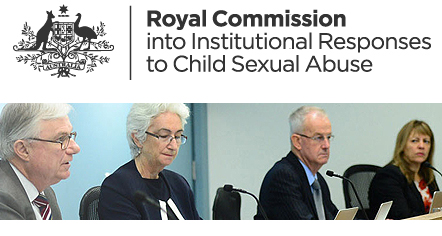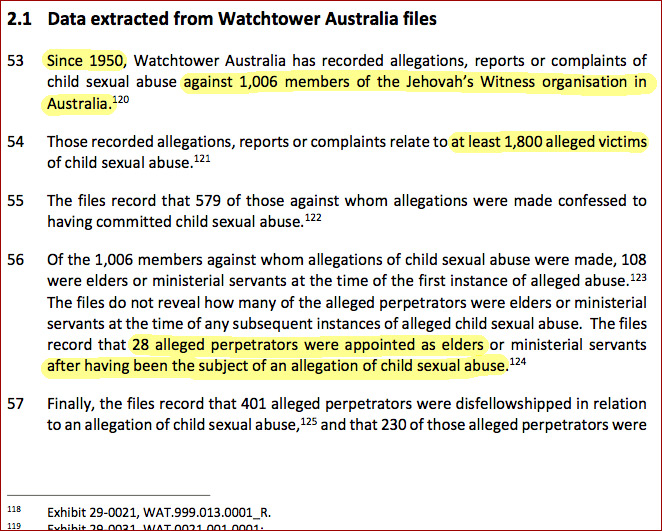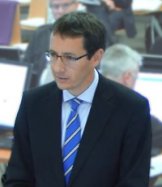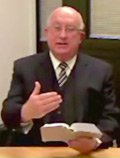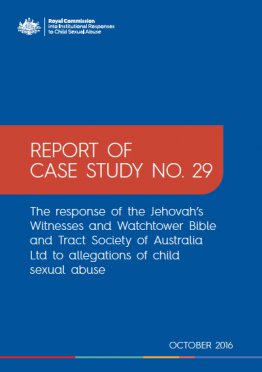Child Sexual Abuse among Jehovah’s Witnesses – Australia
The Royal Commission in Australia investigated from 2013 - 2017 how Australian institutions (schools, churches, sports clubs, government institutions) deal with cases of child sexual abuse. For the benefit of children, the Commission identified where systems fail to protect children and made recommendations on how to improve laws, codes of conduct and practices.
We believe that every interested witness has the right to a correct presentation of the facts in order to respond adequately to comments and allegations from outsiders. It is given here.
The public hearing of Jehovah's Witnesses took place from 27.07.-14.08.2015. They were heard:
- two female abuse survivors,
- the elders and supervisors responsible at the time,
- the Solicitor of the Australia Branch, and
- Geoffrey W. Jackson, member of the Governing Body, via video transmission from Toowoomba.
The official transcripts of all eight days of questioning are available on the official website of the State Investigation Commission:
http://www.childabuseroyalcommission.gov.au/case-study/636f01a5-50db-4b59-a35e-a24ae07fb0ad/case-study-29,-july-2015,-sydney.aspx
The statement of Geoffrey Jackson (14.08.2015) is available here:
Transscript (Day 155).pdf
Main Statements of Geoffrey Jackson
(according official Transscript Day 155)
... on the two-witness rule:
Angus Stewart, Senior Counsel Assistant of the RCCA (AS):
(page 15967 line 24ff)
Turning to another aspect that we have dealt with, which is the question of the two-witness rule, you will be aware that if there is no confession, then two witnesses to serious wrongdoing are required, or to two similar events of serious wrongdoing, in order that there is suffient evidence to establish a judicial committee. [...]
Is there a scriptural basis to that?
Geoffrey Jackson, member of the Governing Body of Jehovah's Witnesses (GJ):
Absolutely. If I could take you to the book of Matthew, chapter 18, that is on page 1330, here are the words of our Lord – verse 16 – the words of our Lord Jesus Christ. This is talkibng in a sense of a judicial setting:



"But if he does not listen, take along with you one or two more, so that on the testimony of two or three witnesses every matter may be established." (Matthew 18:16)
AS: (p.15968 line 47)
So you have referred to Matthew 18:16. As I understand it – and correct me if I am wrong – that, in turn, really, is a reference back to Deuteronomy, 19 verse15. In other words, what Jesus Christ was doing is referring back to that aspect of Mosaic law dealing with evidence?
GJ:
He did quote, as he often did, from the Mosaic law, but he gave it Christian application.
AS:
But that is an element to be found in the Mosaic law, as set out in Deuteronomy 19:15; is that right?
GJ:
It is, an element that is found in both the Old Testament and the New Testament.
AS:
What I am interested in, and perhaps you can help me on this, is why that applies to a case of sexual assault, when clearly what was being addressed in the reference in Matthew that you gave us was not a question of sexual assault?
GJ [quotes 2 Corinthians 13:1 and 1 Timothy 5:19 and explains that the rules of evidence have always remained the same to preserve the spiritual purity of the assembly.]
AS: (p. 15970 line 1)
Mr Jackson, that is exactly the point I want to get to. You will be familiar – and perhaps we can go to it – with Deuteronomy 22:23-27? That´s at page 304, where it is said: (further with line 35)



"If, however, the man happened to meet the engaged girl in the field and the man overpowered her and lay down with her, the man who lay down with her is to die by himself, and you must do nothing to the girl. The girl has not committed a sin deserving of death. this case is the same as when a man attacks his fellow man and murders him. For he happened to meet her in the field, and the engaged girl screamed, but there was no one to rescue her." (5 Mose 22:25-27)
AS:
So the point of this last example is that there´s no second witness, is there, becaus the woman is in the field, she screamed, but there was no-one to rescue her; do you accept that?
GJ:
Could I explain, Mr Stewart, that – you see, I think already under testimony some of Jehovah´s Witnesses have explained that the two-witness needed can be, in some cases, the circumstances. I think there was an example given --
AS:
I will come to that, Mr Jackson. We will get through this a lot quicker and easier if we just address it one step at a time? [...] The present step is this: in that example, you accept it is a case where there was no other witness beyond the woman herself?
GJ:
There was no other witness except the woman herself, but added to that were the circumstances.
AS:
Yes. Well, the circumstances were that she was raped in the field?
GJ:
Mmm-hmm. Yes, they were the circumstances.
AS:
There being only one witness, it was nevertheless sufficient for the conclusion that the man should be stoned to death.
GJ:
Mmm-hmm. Yes.
AS:
Is it not the case that had Jesus been asked about a case of sexual abuse, he may have referred back to this part of Deuteronomy and said that it´s not required to have two witnesses?
GJ:
I certainly would like to ask Jesus that, and I can´t at the moment, I hope to in the future. But that´s a hypothetical question which, if we had the answer, then we could support what you said.
... on Disassociation:
AS: (p. 15981 line 38)
Amd, Mr Jackson, you have put it that they [Jehovah´s Witnesses] have the choice to leave or not to leave. For someone who wants to leave, perhaps because they have suffered abuse by someone in the organisation and don´t feel that it has been treated properly or adequately, it´s a very difficult choice, isn´t it, because they must choose --
GJ:
I agree, yes.
AS:
And it can be a very cruel choice for them - not so?
GJ:
I agree, it´s a difficult choice.
AS:
And it can be personally devastating, because they can lose their whole social network and their families?
GJ:
That can be the case, yes.
AS:
Would you accept, then, that putting people to that choice, through this system of disassociating from them or shunning, as it is sometimes referred to, is contrary to the Jehovah´s Witness belief in freedom of religious choice?
GJ:
No, I don´t accept that. I think you are jumping to a conclusion there, but I understand that you have that opinion.
... Whether Child Sexual Abuse Among JWs is an Apostate Lie:
AS: (p.15984 line 42)
You decribed earlier in your testimony that the work of this Royal Commission is beneficial. Do you accept, then, that the Royal Commission´s efforts are genuin and well-intended?
GJ:
I certainly do. And that´s why we came in to the Royal Commission hoping that collectively something would come forward that would help us as well as everybody else.
AS:
Would you disagree, then, with anyone who said that the efforts to highlight and deal with child sexual abuse in the Jehovah´s Witness church are engaging in apostate lies?
GJ:
I guess that´s a broad question, because sometimes those who make these accusations make many other accusations as well. But let me assure you, the person making the accusation is not the main thing. The main thing is: is there some basis to the accusation. And if there is some way that we could improve, the Governing Body is always interested in seeing how we can refine our policies.
... On Apologising to Victims:
GJ: (p. 15985 line16)
You see, Mr Steward, could I just emphasise, as a religion, two very strong things we feel. One is, we try to keep a high moral standard. Secondly, there is love among the organisation. So we want to treat the victims in a loving way.
AS:
Just on that point, Mr Jackson, has the Governing Body considered apologising to survivors of child sexual abuse at the hands of elders within the organisation?
GJ:
I haven´t been in any discussions with regard to that.
AS:
Is that something that you foresee might happen - in other words, that an apology at least be considered?
GJ:
The Governing Body has apologised on other matters, so for me to say - I can´t speak collectively for everybody, but we have apologised on things in the past, in other areas, so it is perceivable.
... on Compensation Payments for Child Abuse Victims:
The Chair McClellan (MC): (p. 15986 line 2)
You know, I suspect, Mr Jackson, that the Commission is considering a redress scheme for survivors. Are you aware of that?
GJ:
I did hear it mentioned, your Honour, but I have no idea of the details.
MC:
One of the suggestions is that there should be a scheme, national or otherwise, in which all of the institutions in which people were abused come together and provide for an independent decision-making process which would enable a fair distribution of compensation for those who were abused. Do you understand?
GJ:
I do understand, your Honour.
MC:
Would the Jehovah´s Witnesses be prepared to cooperate in a joint scheme with other institutions where people were abused?
GJ:
Your Honour, the answer is we would need to see the details. But the possibility of us making shure help is given to those that have been victims – certainly, that is a possibility.
MC:
Does that mean that the Jehovah´s Witnesses would not, as a matter of principle, decline to join with other institutions in a coordinated redress scheme?
GJ:
Your Honour, we would need to see that nothing was scripturally against us doing that. But there are many times when we have to deal with others with regard to financial matters, so per se, it´s not something that is totally out of the option pool.
Conclusions of the Commission´s Senior Counsel
Of particular interest is Part 11 "Summary of available evidence" from page 126 onwards, which shows the procedures used so far, explains the effects and recommends adjustments and improvements. We translate extracts:
"Teil 11 Summary of available findings
Available findings on the Jehovah’s Witnesses relationship with secular authorities
F1
The Jehovah’s Witness organisation presents its members with conflicting and ambiguous teachings regarding their relationship with secular authorities, thereby fostering a distrust of such authorities.
Available findings on historical child sexual abuse data
F2
Since 1950, the Jehovah’s Witness organisation in Australia has received allegations of child sexual abuse against 1,006 of its members relating to at least 1,800 victims, and has in that period not reported a single allegation to the police or other authorities, even though 579 of those against whom an allegation was made confessed to having committed child sexual abuse.
F3
The Jehovah’s Witness organisation in Australia receives approximately three to four reports of allegations of child sexual abuse each month.
Available findings on the authority of the Governing Body
F39
Mr Spinks’ evidence that the Australia Branch has full authority to produce documents, seminars, letters to elders and letters to publishers without the approval or agreement of the Governing Body is rejected.
F40
The Governing Body retains authority in respect of all publications in the name of the
Jehovah’s Witness organisation and any view or perspective contrary to that of the
Governing Body is not tolerated.
Available findings on the investigation process
F41
There are no circumstances in which the survivor of a sexual assault should have to make her allegation in the presence of the person whom she accuses of having assaulted her, and, contrary to the present position, the documents, manuals and instructions produced by the Jehovah’s Witness organisation should make this clear.
F42 The requirement that two or more eyewitnesses to the same incident are required in the absence of a confession from the accused, the testimony of two or three witnesses to separate incidents of the same kind of wrongdoing, or strong circumstantial evidence testified to by at least two witnesses (i.e. the two witness rule):
a) means that in respect of child sexual abuse which almost invariably occurs in private, very often no finding of guilt will be made in respect of a guilty accused
b) causes victims of child sexual abuse to feel unheard and unsupported when it results in allegations of child sexual abuse not being upheld
c) is a danger to children in the Jehovah’s Witness organisation because its consequence is that very often nothing is done about an abuser in the organisation
d) does not seem to be applied by the Jehovah’s Witness organisation in the case of an accusation of adultery, which suggests that adultery is taken more seriously by the
organisation than child sexual abuse, and
e) needs to be revisited by the Jehovah’s Witness organisation with a view to abandoning it or at least reformulating it to ensure that safe decisions as to someone being guilty of child sexual abuse can be made more easily.
F43
The requirement that only elders (i.e. men) can participate in the making of decisions in the investigation process on whether or not someone has committed child sexual abuse:
a) is a fundamental flaw in that process which weakens the decisions by excluding women, and
b) needs to be revisited by the Jehovah’s Witness organisation to ensure a meaningful role for women.
Available findings on the judicial committee process
F46
Under the current documented judicial committee process, a complainant of child sexual abuse is prohibited from having someone present with her in the judicial committee process to offer support.
F48
The current documented process for responding to allegations of child sexual abuse within the Jehovah’s Witness organisation is focussed largely on the rights and comfort of the accused, with little regard to the requirements of a victim of abuse.
Available findings on sanctions – reproval
F50
Since it is the policy or practice of the Jehovah’s Witness organisation not to report
allegations of child sexual abuse to the police (other than if required by law to do so), if a known abuser is found to be repentant and for that reason merely reproved rather than disfellowshipped he remains in the congregation and a risk to children in the congregation.
F51
The system of not announcing the reasons for reproval means that members of the
congregation are not warned about the risk that such a wrongdoer poses to children in the congregation.
Available findings on sanctions – disfellowshipping
F53
Since it is the policy or practice of the Jehovah’s Witness organisation not to report
allegations of child sexual abuse to the police (other than if required by law to do so), if a known abuser is disfellowshipped he remains in the community and a risk to children in the community.
F54
The sanction of disfellowshipping does nothing to protect children in the community
Available findings on reporting
F55
Prior to this case study, the Jehovah’s Witness organisation in Australia did not advise
congregational elders of their obligations to report the commission of criminal offences to the police under s 316 of the Crimes Act 1900 (NSW).
F56
This report is referred to the Law Society of New South Wales in relation to the conduct of Mr Toole in having failed to advise congregational elders of their obligations to report their knowledge of the commission of certain criminal offences to the police.
Available findings on Mr Jackson’s stated empathy for survivors
F65
Mr Jackon’s failure to have read or be familiar with the testimony of the survivor witnesses yet to have read or otherwise familiarised himself with the testimony of Jehovah’s Witness witnesses belies his stated empathy for the survivors and his stated recognition of the importance of their perspectives.
Available findings on shunning
F69
Members of the Jehovah’s Witness organisation who no longer want to be subject to the organisation’s rules and discipline have no alternative than to leave the organisation which requires that they disassociate from it.
F70
The Jehovah’s Witness organisation’s policy of requiring its adherents to actively shun those who leave the organisation:
a) makes it extremely difficult for someone to leave the organisation
b) is cruel on those who leave and on their friends and family who remain behind
c) is particularly cruel on those who have suffered child sexual abuse in the organisation and who wish to leave because they feel that their complaints about it have not been adequately dealt with
d) is not apparently justified by the Scriptures which are cited in support of it
e) is adopted and enforced in order to prevent people from leaving the organisation and thereby to maintain its membership, and
f) is in conflict with the organisation’s professed support for freedom of religious choice and the belief that Jehovah God is a compassionate God who recognises the worth and dignity of all human beings.
Angus Stewart SC
25 September 2015"
Final Report of the Royal Commission
The Royal Commission´s Final report on Case Study No. 29 (Jehovah's Witnesses) was published in October 2016. The conclusions can be found at page 77 ff.


